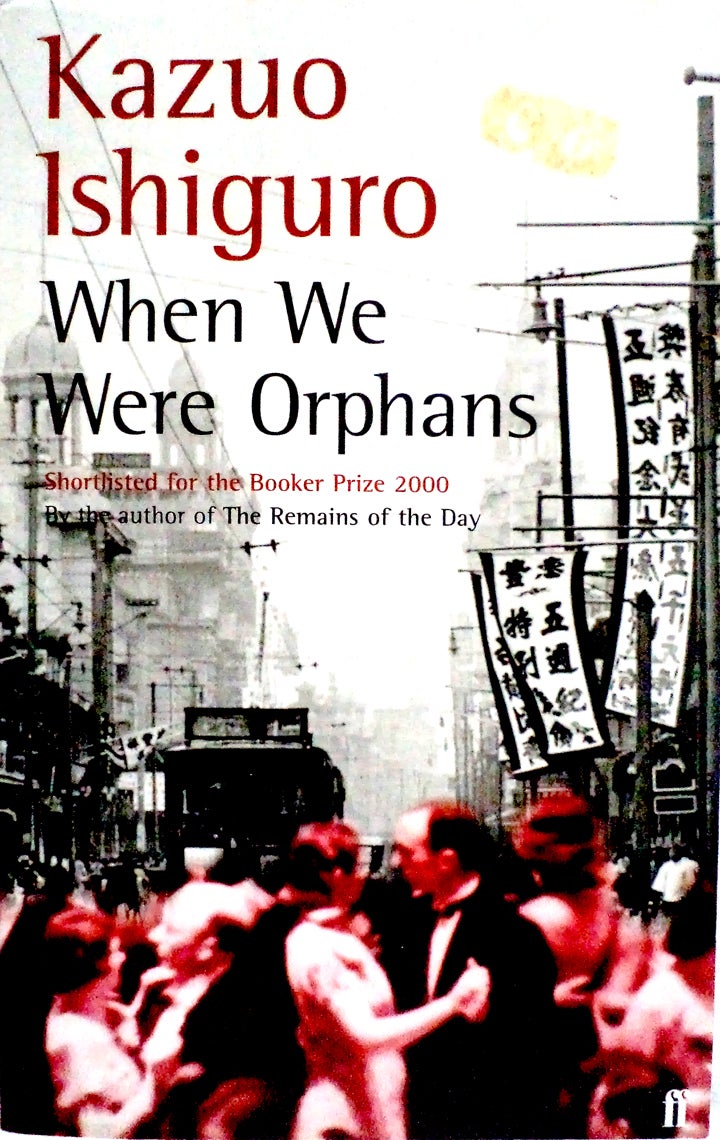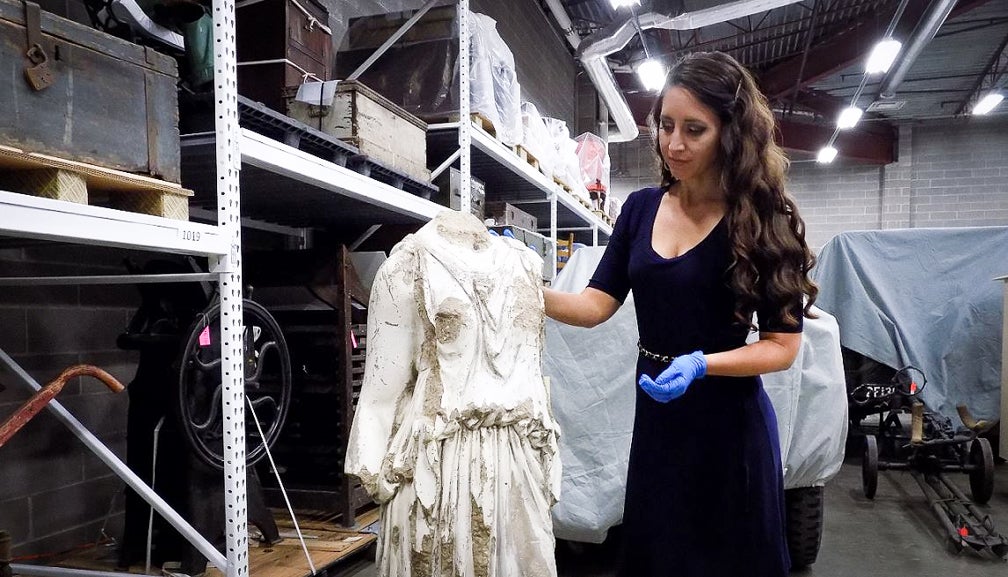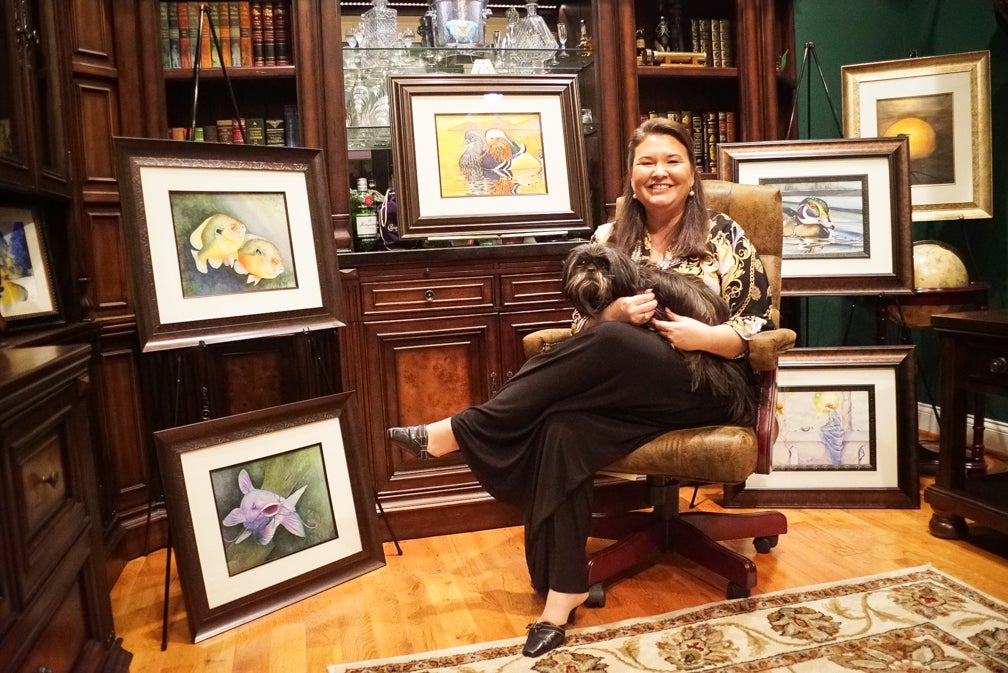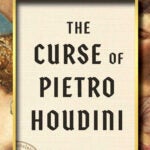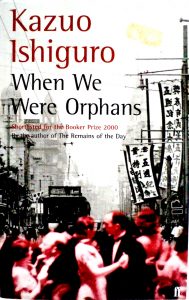
“When We Were Orphans” by Kazuo Ishiguro
From the winner of the Nobel Prize in Literature and author of the Booker Prize-winning novel “The Remains of the Day” comes this stunning work of soaring imagination.
Kazuo Ishiguro has the extraordinary talent of pulling you so deeply into the mind of an Englishman that you lose yourself. That stiff upper lip and valiant attitude of the mid-century United Kingdom is one of the main characters in many of his works. In “The Remains of the Day,” this is personified in the English butler who comes to the end of his career and goes on a search to find out who he is without his work. As he roams the hills of the country, you begin to question these seemingly positive traits of British society and their detriments.
In “When We Were Orphans,” Ishiguro further examines how this stoicism can influence a person’s life. It is the story of a boy named Christopher Banks, raised in the Shanghai International Settlement in China. His parents disappear, setting him on a course to become one of the most renowned detectives in London. A mysterious woman catches his affections, and when she herself returns to Shanghai with her husband, he uses the opportunity to return and goes to work at finding his parents and solving the case that has shaped his entire life.
What sounds like a straightforward plot for a mystery novel is instead a fascinating look at what drives a person through their life and how repressed emotions can have consequence. Christopher becomes an orphan at 10 years old from the loss of his parents. He is an orphan in other ways as well; from his country by being born an outsider in a colonial settlement, from his emotions due to the culture of his upbringing, and from himself by driving his life toward a singular goal while never questioning if it is worth giving up the rest of his life.
As the book reaches its climax, the narrative begins to take on a dreamlike quality, following Christopher through bloody war zones and almost absurd violence. In Shanghai, the colonizers and the colonized mingle while they each fight their own wars. Christopher himself is a man without a country; is he British because his parents were, or is he something else, born outside and never quite fitting in to the country that he believes should be his home. Both Christopher and the reader stand at arm’s length from the action in the story, seemingly uninvolved in a story that completely revolves around their participation.
Ishiguro says himself that this book was not his best work, but the playfulness of the narration along with the snakelike plot line makes it something fresh and different. If you are looking for something a bit off the beaten path by a master of his craft, you have found it.
Kazuo Ishiguro is the 2017 winner of the Nobel Prize in Literature. His work has been translated into more than 40 languages. Both “The Remains of the Day” and “Never Let Me Go” have sold more than 1 million copies, and both were adapted into highly acclaimed films. Ishiguro’s other work includes “The Buried Giant,” “Nocturnes,” “A Pale View of the Hills” and “An Artist of the Floating World.”
— Reviewed by Ernie Dixon, web/technologies librarian, Paul Sawyier Public Library
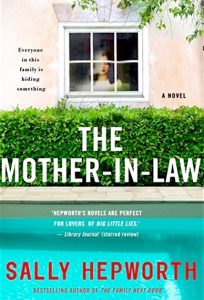
“The Mother-In-Law” by Sally Hepworth
“Deliciously entertaining, packed with wit and suspense, and also delivers sharp insights about family dynamics and love.” — People magazine
Lucy is happy to be married to Ollie and hopes to become part of his family, wanting nothing more than to be accepted by them. But, even though her husband’s father and sister welcome her with open arms, her mother-in-law, Diana, does not. She is polite and appropriately friendly to Lucy but holds her at arm’s length. This is not the relationship that Lucy envisioned.
Several years later, Diana is dead apparently of a suicide, but the police find evidence to suggest otherwise. Who could possible want Diana dead? Could it be Ollie who has financial problems with his business? Ollie’s sister Nettie or her husband who cannot wait to inherit? Or Diana, herself, who is weary of the strain of the antagonizing relationship?
Hepworth’s novel is told through two viewpoints, Lucy’s and Diana’s, and as you move along, you find that Lucy comes to better understand Diana. Not really a thriller, “The Mother-In-Law” is more of a study between two women centered on a mysterious death.
— Reviewed by Paul Sawyier Public Library
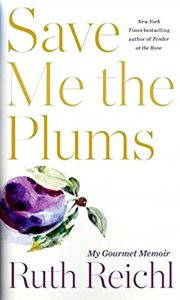
“Save Me the Plums: My Gourmet Memoir” by Ruth Reichl
Ruth Reichl has written numerous memoir titles all concerning her food career. She was a food critic for the Los Angeles Times and the New York Times, which gave her numerous, memorable situations; such as when she would disguise herself and slip into a restaurant to order the specialty hoping that the kitchen chefs had not bribed the wait staff to identify her before the meal was prepared.
Reichl also spent 10 years directing the operations of Gourmet magazine, America’s oldest epicurean publication, until the internet turned the magazine world upside down. Reichl did not anticipate the rivalry that would develop between Gourmet magazine and the company’s off-spring food site Epicourious. Epicourious controlled all the Gourmet recipes, as well as those of other magazines.
Under Reichl’s leadership Gourmet tried to move their content into the video side of the internet. Featuries included a cheesemaker who could carve enormous wheels that would have impressed Michelangelo, and another who kept the milk from each cow separate to market the cheese to discriminate chefs.
“Save Me the Plums” does contain numerous recipes plus the story of a former Berkley hippie coming to grips with the corporate world, the farm-to-table movement, and many legendary chefs. The recipes that Reichl shares are surprisingly simple: cheddar scallion biscuits, Thanksgiving turkey chili, spicy Chinese noodles, or jeweled chocolate cake.
But this memoir is about more than food. It is a personal journey of a woman allowed to be in charge and achieving the success that she dreamed of when she read Gourmet as an eight year old.
— Reviewed by Poor Richard’s Books
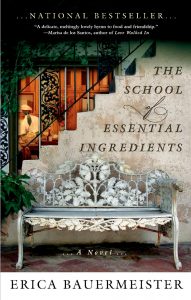
“The School of Essential Ingredients” by Erica Bauermeister
Frequently, I wonder what kind of world might I create if I had a magic wand. I could remedy civic problems, social injustice and heal the heartache of many friends. But every day I do change the world one meal at a time! Food is something that brings people together and begins conversation, and conversation is “food for the soul.”
We don’t know much about the novel’s main character, Lillian. When she is four years, old her father abandons the family and she begins to take care of her fragile, broken-hearted mother. By the time she is eight years old, Lillian cooks all their meals while her mother can only read books out loud. Lillian is determined to cure her mother with food. She is certain the potatoes, milk, butter and parmesan could be magical. Her mother eats, and becomes silent with awe. But Lillian doesn’t want a silent mother, she wants a mother that will converse with her instead of just reading aloud. She keeps trying to find the soulful dish that will re-connect her mother to her family.
Eventually, Lillian opens her own restaurant and offers cooking classes in the evenings. She shares with others her philosophy that food can heal as well as connect. One young woman is becoming a mother for the first time; there is a lawyer whose life is shattered with loss; an immigrant accepting a new life; and a married couple who have secrets the others would never suspect. Lillian shocks her students stating that there are no recipes. But she has her students close their eyes and focus on a variety of scents of spices. She suggests that they use whichever they choose and however much they want. She also asks personal questions, not about what they do but what makes them happy.
Each chapter is about a different student and how Lillian uses food to help each one evolve and prepare unique dishes.
I was hopeful that this novel would include recipes with the “essential ingredients” but then I realized that the point was to experiment and be creative. One recipe does not suit all occasions. Think of all the kitchens in your life and what was celebrated there, and what emotions are imprinted in your memory. A meal is not only about the science or a treat for the taste buds but also about about the love that goes into making it.
— Reviewed by Poor Richard’s Books

